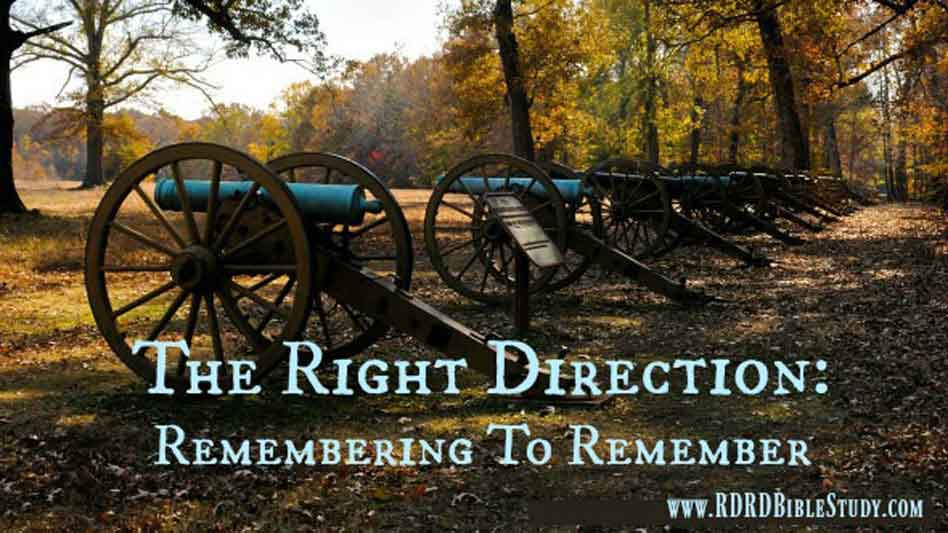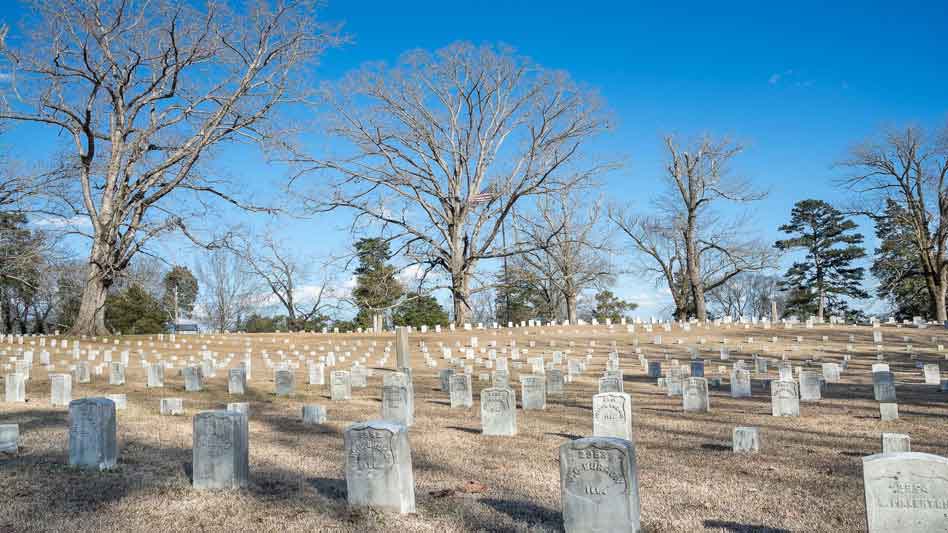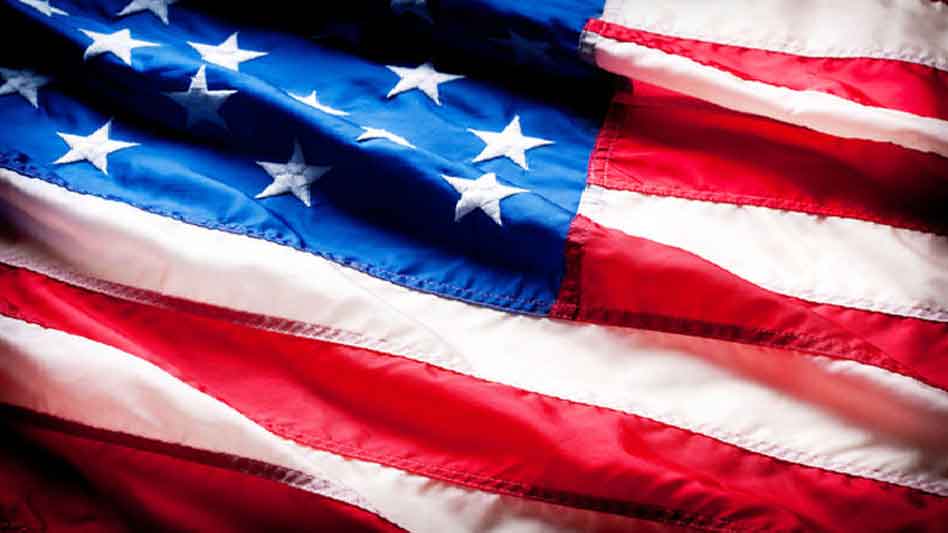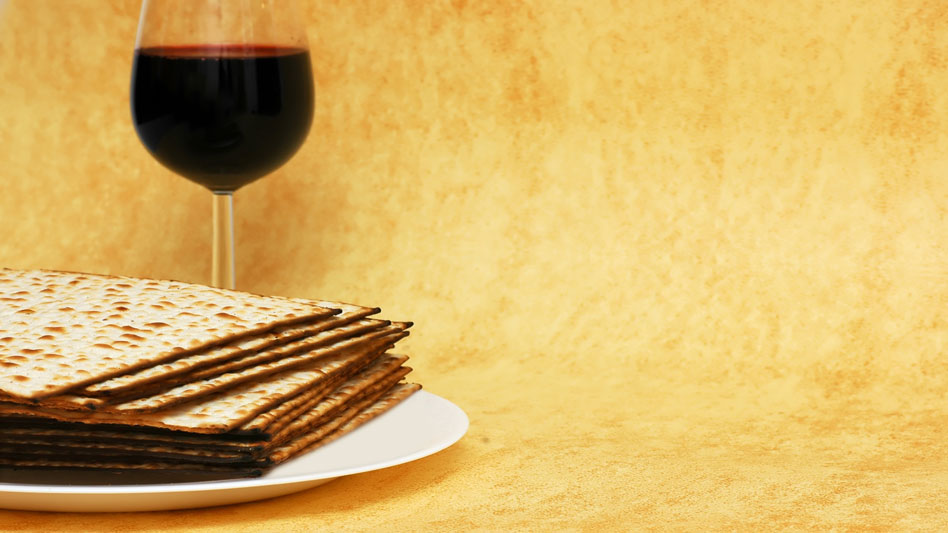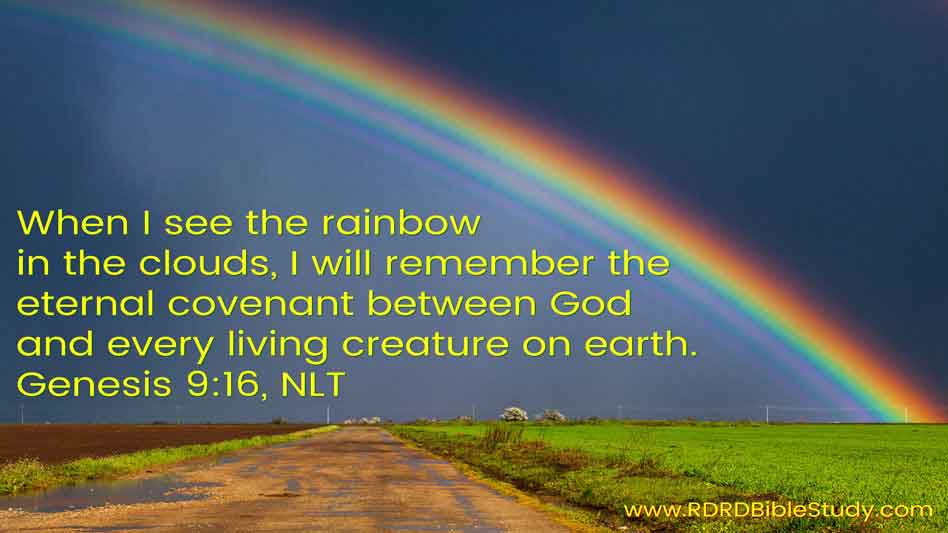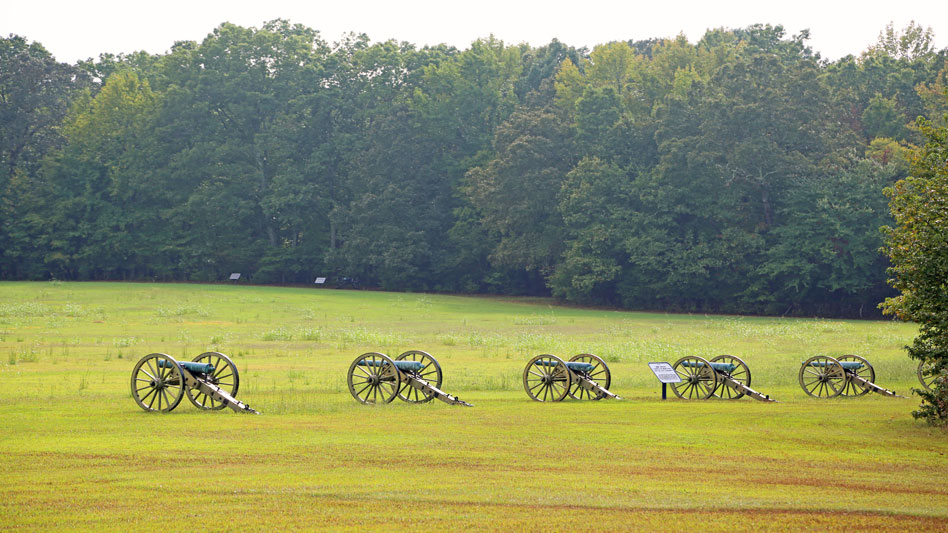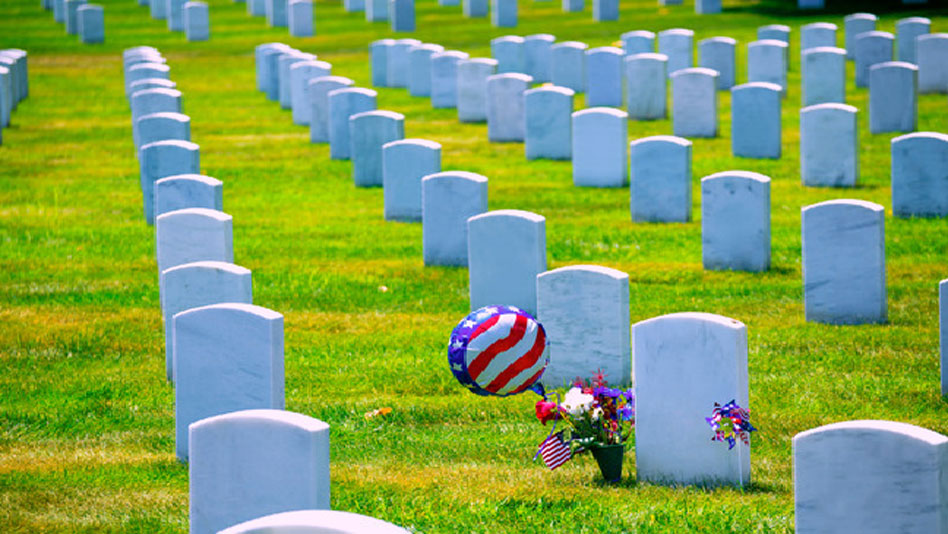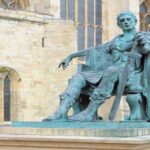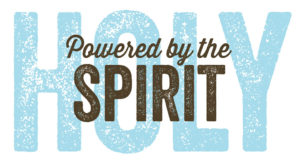Sometime during the early 70’s, my paternal grandmother, “Mam-Maw,” joined us on a family road trip to Shiloh National Military Park, the scene of the Civil War Battle of Shiloh. The day included visiting battle sites and various memorials.
Pointing In The Wrong Direction
On the way home the conversation centered on Shiloh and its historical significance. So no one really noticed that Mam-Maw had become increasingly enraged. Suddenly, with righteous indignation, she declared, “the cannons were pointing in the wrong direction! They were pointing toward the south!” And she grumbled and murmured the entire way home.
Being too young to remember this conversation, or the humor of it, doesn’t matter. I heard its retelling plenty of times—never in Mam-Maw’s presence—followed by grins and laughter.
This feisty lady’s claim that “the cannons were pointing in the wrong direction” proceeded from her logic that
- The cannons were pointing south.
- Shiloh was in Confederate country.
- Confederate cannons should be facing north.
Admittedly, this brought many smiles over the years. Didn’t Mam-Maw know that the cannons would face the enemy regardless of direction? Not to mention that the cannons were posed for tourists?
Mam-Maw’s Patriotism
It still makes me smile to remember Mam-Maw’s staunch indignation. As I’ve grown older and perhaps a little wiser, I have often thought about her statement and the passion that motivated it. It’s truly a shining example of patriotism.
If at this point you think patriotism and the Civil War cannot be discussed in the same sentence—first, shame on you, and second, three words: context, context, context.
Context is of utmost importance in Bible Study, likewise in life situations. Think about Mam-Maw’s context:
- Mam-Maw was born in 1898 in the south, and one of 13 children
- The Battle of Shiloh began on April 6, 1862
- It was the bloodiest battle to date of the Civil War, over 23,000 causalities
- Shiloh was the bloodshed commitment to the Civil War, for both North and South
- TV’s were not invented until the 1920’s
- TV’s became popular household items in the late 1950’s
Mam-Maw Never Heard of CNN
To any critical thinker, these facts explain Mam-Maw’s issue with the cannons.
Our society cannot imagine communication without cell phones and the internet. But during my grandmother’s era, long before these things were invented, a purer kind of communication existed. An unadulterated and real kind of communication.
Think of the eyewitness accounts of the Battle of Shiloh that she heard, stories told to friends and family “back home.” And those stories told by friends and family “back home.” Certainly my grandmother had relatives, neighbors, and/or friends of the family who were killed or wounded in battle—and she knew all of this without ever looking at ancestry.com or history.com.
As of April 6, 1862, the Battle of Shiloh was the bloodiest battle of the Civil War with over 23,000 casualties.
So, 1862 to, say 1918 for example, Mam-Maw would have been 20—less than 50 years since the Battle of Shiloh took place! Plenty of civil war widows still around. Plenty of parents and grandparents who had lost sons and grandsons. Plenty of sons who had lost dads. Maybe even a few survivors.
Cemetery at Shiloh National Battlefield
Mam-Maw didn’t have a TV. She never surfed the internet. She never watched a documentary on The History Channel, a YouTube reenactment video, or an interactive battlefield map.
Words and Imagination
All she had were first hand accounts and her imagination. Less than 200 miles from her northwest Alabama home, the Union Army came “down from the north” and killed 100’s of 1000’s of Confederate soldiers.
Close your eyes. Pretend you’re 20 (or 12, or 16). Imagine someone describing this battle to you. Maybe you can understand her righteous indignation over “the cannons pointing in the wrong direction!”
Remembering The Human Sacrifice Properly, and Respectfully, Mattered to Her
Though the cannon remark brought laughter through the years, sadly the spirit of it was overlooked. Mam-Maw, who weighed 100 pounds soaking wet and would step on a snake if it crossed her path (or even if it didn’t), cared about the human sacrifice made in battle. And she cared about the sanctity of the “truth”—that the battle be remembered properly. Because in remembering it properly meant also remembering the tragedy respectfully.
This time in history meant something to her. The deaths mattered to her. When she made the cannon remark, she had already celebrated 70+ birthdays. Her patriotism pointed in the right direction regardless of the positioning of the cannons.
Patriotism: love and support of your country (and yes, even when it is at odds with itself; don’t you love your country today?).
Memorial Day—Remembering To Remember
Americans today have History Channels, Internet, and 24-hour news channels pumping us third-party facts and three-cent opinions. Most of us have never lived with the threat of an all-out war in our backyard.
Yet Memorial Day, for some, is no more than a day off work, the beginning of summer vacation, or some men wearing funny hats. We have so many advantages. We have liberty and independence. And still our thoughts concerning Memorial Day remain pointed in the wrong direction.
Traditional Observance of Memorial Day
Memorial Day is a federal holiday in the U.S. The holiday serves as a day to remember all the men and women who have died while serving in the armed forces. The day is observed every year on the last Monday of May.
Mam-Maw didn’t have a TV. She never surfed the internet. She never watched a documentary on The History Channel, a YouTube reenactment video, or an interactive battlefield map.
Words and Imagination
All she had were first hand accounts and her imagination. Less than 200 miles from her northwest Alabama home, the Union Army came “down from the north” and killed 100’s of 1000’s of Confederate soldiers.
Close your eyes. Pretend you’re 20 (or 12, or 16). Imagine someone describing this battle to you. Maybe you can understand her righteous indignation over “the cannons pointing in the wrong direction!”
Remembering The Human Sacrifice Correctly Mattered to Her
Though the cannon remark brought laughter through the years, sadly the spirit of it was overlooked. Mam-Maw, who weighed 100 pounds soaking wet and would step on a snake if it crossed her path (or even if it didn’t), cared about the human sacrifice made in battle. And she cared about the sanctity of the “truth”—that the battle be remembered correctly. This time in history meant something to her. The deaths mattered to her. When she made the cannon remark, she had already seen 70+ birthdays. Her patriotism pointed in the right direction regardless of the positioning of the cannons.
Patriotism: love and support of your country (and yes, even when it is at odds with itself; don’t you love your country today?).
Memorial Day—Remembering To Remember
Americans today have History Channels, Internet, and 24-hour news channels pumping us third-party facts and three-cent opinions. Most of us have never lived with the threat of an all-out war in our backyard.
Yet Memorial Day, for some, is no more than a day off work, the beginning of summer vacation, or some men wearing funny hats. We have so many advantages. We have liberty and independence. And still our thoughts concerning Memorial Day remain pointed in the wrong direction.
Traditional Observance of Memorial Day
Memorial Day is a federal holiday in the U.S. The holiday serves as a day to remember all the men and women who have died while serving in the armed forces. The day is observed every year on the last Monday of May.
Decoration Day
Decoration Day
Memorial Day, originally known as “Decoration Day” originated in the South in 1866. Later in 1868, the North began celebrating the tradition too.
“Decoration Day” was a somber day of remembering the lives lost in the Civil War. Americans set aside time to visit cemeteries and decorate the graves of those who had lost their lives in battle.
Both the North and South practiced this tradition, but on different days. In the 19th century, the two holiday traditions were merged to become a national Memorial Day. In addition, the celebration was extended to honor all Americans who died in military service.
Memorial Day and Veteran’s Day
Memorial Day is not to be confused with Veteran’s Day.
Memorial Day is a day of remembering the men and women who died while serving, Veterans’ Day celebrates the service of all U.S. military veterans.
National Moment of Remembrance
In order that Americans wouldn’t forget to remember Memorial Day correctly, the National Moment of Remembrance was instituted. The official statement is:
“In order to re-educate and remind Americans of the true meaning of Memorial Day.”
The resolution was passed in December 2000 by then President Bill Clinton. On Memorial Day, at 3 p.m. local time all Americans are asked to pause whatever they are doing for 1 minute, and observe in their own way, a Moment of Remembrance.
The Flag
On Memorial day, the U.S. flag is raised to the top of the staff, then solemnly lowered to the half-staff position where it remains only until noon. It is then raised to full-staff for the remainder of the day.
The half-staff position remembers the sacrifice made by more than one million men and women who gave their lives in service of their country.
Remembering The Human Sacrifice Correctly Matters
At noon, the flag is raised to full-staff. This symbolizes the commitment of those living, to honor the memory of those who gave their lives by making a commitment not to let their sacrifice be for nothing. But to be thankful for the freedom we enjoy, while at the same time rising up to meet the call in our own lives—however it may come—to defend liberty and justice for all.
This is a solemn, yet glorious, picture of death, sacrifice, and rebirth.
We Need Memorial Day – Remembering To Remember
As humans we need Memorial Day. We need it because it is our nature to forget, to take things for granted, and to think the past doesn’t really have anything to do with in the present.
God Knows We Forget
As soon as the Israelites arrived at Mt. Sinai, long before they had their own land, God gave them a constitution. The Mosaic Law. In the law, holy days were established throughout the year, New Moons for each month, Sabbaths for each week. All to help the people remember to keep God at the forefront of their lives.
Passover – Remembering To Remember
Elements of a Passover Meal
God protected the Hebrew people from the Egyptian plagues, delivered them from harsh slavery, and enabled their miraculous crossing of the Red Sea on dry ground—big, big miracles that seem impossible to forget.
Yet they still needed something to help them remember their deliverance and to encourage the future generations by its retelling. Even before they left Egypt, Passover was instituted for this reason. Before they did the thing that God wanted them to remember, God had them initiate the celebration to remember it.
The Lord’s Supper – Remembering To Remember
Elements of the Lord’s Supper
The first Christians weren’t immune from this human propensity for forgetfulness. Jesus instituted the Lord’s Supper to do “in remembrance of Him” even before He did the thing He wanted to be remembered.
Paul says in 1 Corinthians 11:23-26:
For I received from the Lord what I also delivered to you, that the Lord Jesus on the night when he was betrayed took bread, 24 and when he had given thanks, he broke it, and said, “This is my body which is for you. Do this in remembrance of me.” 25 In the same way also he took the cup, after supper, saying, “This cup is the new covenant in my blood. Do this, as often as you drink it, in remembrance of me.” 26 For as often as you eat this bread and drink the cup, you proclaim the Lord’s death until he comes.
1 Corinthians 11:26 points out 2 principal things about “doing this in remembrance of Me”:
- Each time we celebrate the Lord’s Supper we proclaim Christ’s death, that is, we remember what He did on our behalf. The breaking of the bread is for the remembrance of Christ’s broken body upon the cross. The cup is for the remembrance of Christ’s shed blood, i.e. death on the cross. Without the shedding of blood there is no forgiveness of sins (Heb. 9:22). In the Law, the priests offered blood that was not their own each year (Heb. 9:25). But through His death Jesus’ offered His own blood, the blood of the eternal covenant (Heb. 13:20). That is why Christ says in Matthew 26:28 “for this is my blood of the covenant, which is poured out for many for the forgiveness of sins.”
- Each time we celebrate the Lord’s Supper we also remember Jesus’ death “until He comes,” that is we remember Christ will one day come again. After Jesus instructed His disciples to drink of the cup, He said “I tell you I will not drink again of this fruit of the vine until that day when I drink it new with you in my Father’s kingdom” (Matt. 26:29). This looks forward to the great marriage supper of the Lamb (Rev. 19:9) when Christ comes again and gathers all His people to heaven.
Until Jesus Comes
1 Corinthians 11:26 is the Christian version of raising the flag to half-staff and full-staff. The half-staff position of proclaiming the Lord’s death, remembers the sacrifice made by Christ on our behalf. And the full-staff position of proclaiming His death “until He comes” remembers our commitment to remain faithful to Christ–until He comes.
- We are remembering the past—Jesus died for us.
- We are remembering the present—our faith in Jesus.
- We are remembering the future—Jesus Christ is coming again.
Remembering The Significance Of God’s Acts Throughout History
I don’t pretend for a moment to know God’s will in all things–or even a few things. But I do know that it is His will that Christians remember the life, death, and resurrection of Jesus Christ. And it seems safe to say that it is also God’s will that we remember other life-changing events. Not that we say “oh yeah, that happened.” But to recall the significance of certain events so that we will be encouraged to live by faith with strength and gratitude.
Here are only a few examples where this is taught in Scripture:
- I have placed my rainbow in the clouds. It is the sign of my covenant with you and with all the earth. Genesis 9:13, NLT
- Remember what the LORD your God did to Miriam on the way as you came out of Egypt. Deuteronomy 24:9
- Remember what Amalek did to you on the way as you came out of Egypt. Deuteronomy 25:17
- Do you not yet perceive? Do you not remember the five loaves for the five thousand, and how many baskets you gathered? Matthew 16::9
- Remember Lot’s wife. Luke 17:32
- I, Paul, write this greeting with my own hand. Remember my chains. Grace be with you. Colossians 4:18
- Remember your leaders, those who spoke to you the word of God. Consider the outcome of their way of life, and imitate their faith. Hebrews 13:7
- But you must remember, beloved, the predictions of the apostles of our Lord Jesus Christ. Jude 1:17
- Now these things happened to them as an example, but they were written down for our instruction, on whom the end of the ages has come. 1 Corinthians 10:11
Remember when you placed your faith in Christ–that is, after all,one of God’s great acts in history. Remember your baptism. Remember. Remember.
…And Back To Mam-Maw
Cannons on Shiloh Battlefield
Which brings me back to Mam-Maw. Why was she so adamant about the cannons being pointed in the wrong direction? Why did she passionately remember—at 70+ years—the human sacrifice for freedom that happened before she was even born?
Maybe Mam-Maw never had a chance to take her freedom for granted—she lived through WWI, Pearl Harbor, WWII, Korea, Vietnam, the reality of the Depression, and the threat of Communism and nuclear war.
Maybe her own freedom, and hope for peace, was one of the few sure things in her life.
Maybe Mam-Maw had the real “remember” advantage after all?
Today’s Generations (Including Boomers)…
But that doesn’t satisfactorily explain why today’s generations so easily forget?
Or maybe it is they don’t remember passionately?
We haven’t really had a chance to take our freedom for granted either. Our country today has been at war since 2001. Aren’t all adults in the U.S. aware of this? Don’t we have the same kind of threats, as those during the 19th and 20th centuries? Don’t we have sinister new threats that earlier generations did not have. Disinformation abounds. Ignorance of economics, history, personal responsibility, and freedom abound. Lack of gratitude abounds. Failure to see others as human beings abounds.
Earlier Generations And A Common Cause
The earlier generations, along with the leadership of their Presidents, rallied behind a grand ole nationalism, they rallied for a common cause.
But today?
In the last 30 years… Leadership? Common cause? Up until January 20, 2017, the United States had no President that shared a common cause with the American citizens.
The media is filled with all sorts of opinions about the military, past wars, and liberty and justice for all, which as far as I can tell serve two purposes:
- to cloud our faltering memories even more regarding the true meaning of Memorial Day, and
- to aid Americans in the failure to raise the flag to full-staff, that is, to remember our duty on Memorial Day—the commitment of those living, to honor the memory of those who gave their lives ; ironically the media’s privilege to openly share all of these “newsworthy” opinions, have been made available by the sacrifice of military men and women who have died fighting for this country’s freedom.
Why Do We Forget to Remember?
Arlington Cemetery
So, why do people today forget to remember? After all, we have the clear “remember” advantage—TV, internet, social media, interactive battle maps, history books, museums, etc. Why do we have to have a day to help us remember? Not to mention a minute to help us remember correctly. Why are our thoughts and memories not pointed in the right direction?
Maybe the answer is that Mam-Maw had the real “remember” advantage after all. The real freedom. The freedom of hearing eyewitness testimony and having her imagination inform her mind, heart, and soul.
In other words, hundreds of voices were not telling her what to think and believe.
Memorial Day is a day for Americans to remember to remember.
- To remember the past—all the lives of military men and woman lost in service to the U.S. for the citizens of the U.S.
- To remember the present—that we live in a free country
- To remember the future—we will rise up to meet the call in our life to defend liberty and justice
The Right Direction
We can all agree that anything pointed in the wrong direction will end up in the wrong place. Point your thoughts in the right direction and remember freedom’s real cost. Remember to remember.
- Use your imagination.
- Take it personal.
- Be thankful for your freedom.
- Visit a cemetery.
- Raise an American flag.
- Pray for families who have lost loved ones.
- Honor those who have given their lives for your freedom.
- Don’t believe popular opinion because it’s popular but only if it’s true.
- Believe what you know in your heart to be true.
- Think for yourself.
- Think for yourself.
- And Think for yourself.
Remember to remember.
Until next time –
The grace of the Lord Jesus Christ and the love of God and the fellowship of the Holy Spirit be with you all. (2 Corithians 13:14)
*About the feature image – Photo by Steve Markos / www.npplan.com

